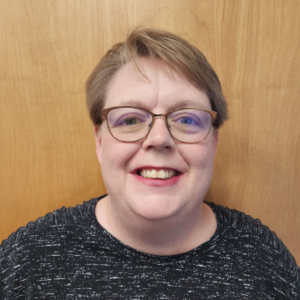 Cressie Vargo understands firsthand how difficult it can be to find child care. As a mother of three living in a small town in rural Michigan with a partner who worked third shift, she struggled to find local trusted care for her youngest a couple of years ago. When she worked with families as a Family Service Advocate at Head Start, she saw the struggle play out time and time again as families worked to advocate to find care and resources to support their children’s success. Based on an experience in her community, Cressie saw the issue from another angle: a young scholarship college student who was forced to stop attending college full time to return to the workforce and provide care for a younger sibling. These moments stuck with her and reinforced how deeply child care challenges can impact a family.
Cressie Vargo understands firsthand how difficult it can be to find child care. As a mother of three living in a small town in rural Michigan with a partner who worked third shift, she struggled to find local trusted care for her youngest a couple of years ago. When she worked with families as a Family Service Advocate at Head Start, she saw the struggle play out time and time again as families worked to advocate to find care and resources to support their children’s success. Based on an experience in her community, Cressie saw the issue from another angle: a young scholarship college student who was forced to stop attending college full time to return to the workforce and provide care for a younger sibling. These moments stuck with her and reinforced how deeply child care challenges can impact a family.
When Cressie’s youngest needed child care so that Cressie could work, she discovered that her local child care center was at full capacity. With limited local options at the time, she had no choice but to drive to a neighboring town, twelve miles away, to access trusted quality care. “Finding quality child care was one of the struggles that drove me to get involved with early childhood advocacy with Think Babies Michigan,” said Cressie.
That drive has only deepened. Her personal experiences combined with what she has seen through her professional roles has sparked a deep commitment to advocating for working parents of young children. Cressie has been a leader with Think Babies Michigan since its inception. What solidified her commitment was seeing the connection between child care and the health of a community.
Child care is a central issue to so many parts of parents’ and even extended family’s lives. Cressie shared an example: “When a family has care through a grandparent or other family member, that’s wonderful. But what if that caretaker becomes ill or has another commitment? Then the parent has to find other care or miss work and that has a ripple effect. When someone misses work, it affects their job security and advancement opportunities. Missing work can also affect the productivity and efficiency of the workplace. What happens if someone lives far away from family or work and doesn’t have a trusted family member to help support child care?” Cressie’s experiences have given her a broad view of how families, community members, and employers all rely on each other to grow and thrive.
Cressie sees the dynamics between work, family and community as interwoven. “I think it boils down to; not everyone has a village, and the reasons are kind of irrelevant. What ultimately matters is how we create that village. Part of that is through accessible child care where people feel their child is safe.” Cressie’s viewpoint of how communities need to holistically support families in order to thrive and grow crosses institutions and community sectors.
Cressie is an active advocate with Think Babies Michigan and feels confident in her ability to speak with lawmakers and decision makers. She credits her lived experience, opportunities to learn, and the people she has come to know as an advocate for helping her grow into the role of active advocate for Michigan families.
Cressie encourages anyone interested in building resilient families and communities to get involved. She is motivated, and this is a long-term commitment for her. “I want my children to be able to access child care, find professional fulfillment, and celebrate their families. I don’t know all the answers,” said Cressie, “but I do know we need to all work together and advocacy is one way we can do that.”
